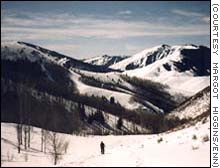
|
|
 |
| nature |
.gif)
.gif)
|
EDITIONS: | |
|
MULTIMEDIA: | |
| E-MAIL: | |
| Subscribe to one of our news e-mail lists. Enter your address: | |
|
Or: Get a free e-mail account | |
| DISCUSSION: | |
| message boards | |
| chat | |
| feedback | |
| CNN WEB SITES: | |
| AsiaNow | |
| En EspaŮol | |
| Em PortuguÍs | |
| Svenska | |
| Norge | |
| Danmark | |
| Italian | |
| FASTER ACCESS: | |
| europe | |
| japan | |
| TIME INC. SITES: | |
| CNN NETWORKS: | |
 | |
| more networks | |
| transcripts | |
| SITE INFO: | |
| help | |
| contents | |
| search | |
| ad info | |
| jobs | |
| WEB SERVICES: | |
|
No middle of the road to roadless recreation
| ||||
Sometime before President Clinton bids farewell to the White House, nearly 60 million acres of roadless areas in national forests will likely be protected from resource extraction that typically involves roads.
In place of logging concessions, the American public will have free reign to roam in roadless areas. But while many recreation groups are ecstatic at the thought of cavorting on lands free from the scars of industry and development, some environmentalists hear the forest service till ringing a wrong note.
"The forest service is actively transitioning from being a classic extractive business of logging, mining and grazing to becoming a business focused on providing recreational opportunity to paying customers," said Scott Silver of Wild Wilderness in Bend, Oregon.
Groups such as Silver's fear that industrial recreation in the form of off-road vehicles, ski areas and privately owned food and lodging concessions at the foot of roadless areas will be just as harmful to the land as chain saws, mine shafts and bulldozers.
Even though industrial recreation does not result in a clear-cut landscape, it does cause air, water, soil, plant and noise pollution, said Sunny Sorensen of the Sierra Club's recreation issue committee.
Geraldine Hughes, public policy director of the National Ski Areas Association, agrees.
"The areas directly adjacent to resorts do not really have the roadless characteristics that we are seeking to protect through this proposal," she said.
While environmentalists worry that the forest service aims to make money from recreation, Hughes doesn't want the roadless initiative to inhibit ski area expansion plans.
"We support the protection on inventoried roadless areas," she said, "the only caveat being that we do not support any proposal that unnecessarily limits the flexibility for resorts to grow in the future."
Clinton introduced the roadless initiative on Oct. 13, 1999 as a means to protect "those lands within the National Forest System that remain largely untouched by human intervention."
| ||||
The U.S. Forest Service presented it's preferred plan for the protection of nearly 60 million acres of inventoried roadless areas in national forests to U.S. Department of Agriculture Secretary Dan Glickman on Nov. 13. Glickman is expected to make a final decision sometime before Clinton leaves office.
"I am here making the assumption that he (Clinton) wants to see it tied off on his watch," said Steve Marshall, information team leader for the roadless project with the U.S. Forest Service.
The forest service's preferred alternative would prohibit most construction or reconstruction of roads on inventoried roadless areas. It would also prohibit timber harvest except that which falls under "stewardship" in the same areas. How people use the roadless lands for recreation would be left to local forest managers.
"The roadless rule was fairly friendly to motorized recreation in inventoried roadless areas," said Don Amador, western regional representative of the Blue Ribbon Coalition, a group that lobbies for motorized access to public lands. "I am glad to see the forest service listened to a lot of our concerns."
The mountain biking community also wants decisions about access to roadless areas left at the local level, albeit for a different reason.
"Roadless areas are important to mountain bikers because they are undisturbed and natural and because they often include narrow, single-track trails that off-road bicyclists enjoy," said Gary Sprung of thethe International Mountain Biking Association in Boulder, Colorado.
What mountain bikers and the off-road vehicle community fear most is that groups such as Wild Wilderness will push for the designation of roadless areas as wilderness areas, a designation that prohibits mountain bikers and motorized recreation.
Some environmentalists argue that certain forms of recreation are as environmentally harmful as traditional resource extraction.
"Humans tend to think that if what they do doesn't stress the neighbors it isn't harmful," said Sorensen. "The baseline for stress keeps moving up."
While the Sierra Club and many environmental groups have publicly endorsed the forest service roadless initiative for its ban on logging, Sorenesen isn't confident that the group has examined the document closely enough.
"Many of the big greens are too quick to jump on board to save forest from extraction," she said. "The forest service is never going to offer up anything for nothing. There is always going to be a tradeoff there. It behooves environmentalists to push that tradeoff toward ecology as much as they can."
Copyright 2000, Environmental News
Network, All Rights Reserved
RELATED STORIES:
Lawsuits cripple ski area expansions
October 10, 2000
Nevada protesters take up shovels against federal lands policy
July 3, 2000
Forest Service roadless plan is a detour, say critics
May 10, 2000
Forest Service posts new road policy
March 7, 2000
RELATED ENN STORIES:
Oregon ski resort plan may melt to protect roadless areas
Alaska forest added to roadless plan
Lawsuits cripple ski area expansions
Ski industry takes a closer look at the environment
It's clear cut: Logging trashes trails, coalition says
RELATED SITES:
Wild Wilderness
Sierra Club
National Ski Areas Association
Roadless Area Conservation
Blue Ribbon Coalition
International Mountain Biking Association
Note: Pages will open in a new browser windowExternal sites are not endorsed by CNN Interactive.


